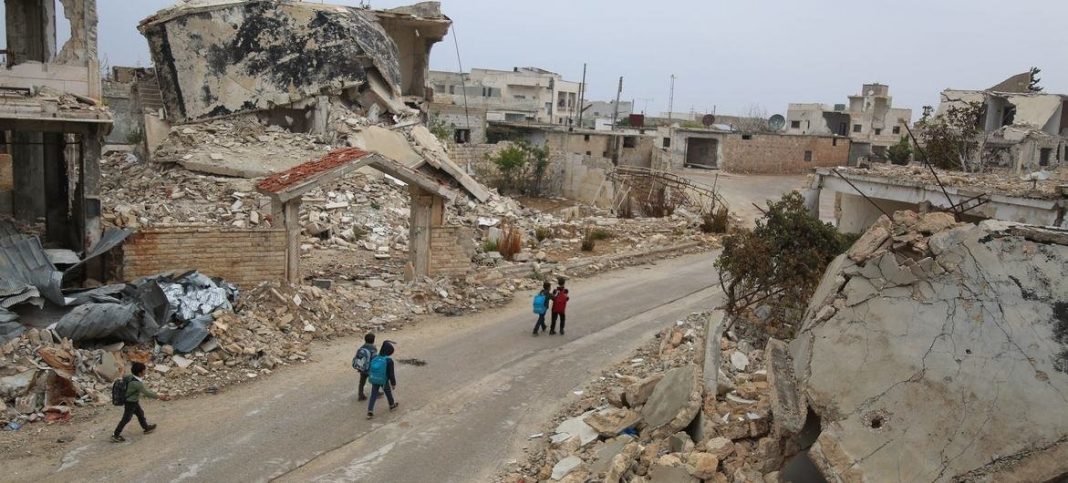By Alice Pistolesi
The suffering of the Syrian population continues unabated. On Wednesday 9 March, Paulo Pinheiro, chairman of the UN International Commission of Inquiry on Syria, described the impact of the 11-year conflict on communities as “devastating” at a virtual press conference.
Half the population displaced
The Commission’s report describes a dramatic situation: hundreds of thousands of people have been killed, more than half the pre-war population (22 million) is now displaced. More than 100,000 are missing or have disappeared. Cities and infrastructures have been destroyed. The poverty rate is unprecedented and affects 90% of the population: 14.6 million people are dependent on humanitarian aid.
In the Northwest, many Syrians forced to abandon their homes “are still living in flimsy tents, stuck in the snow, rain and mud”, reported Pinheiro, before insisting that “some actors seem to spend more energy preventing aid from reaching them than facilitating it”.
The President’s report also points out that even though there are areas excluded from active fighting, communities remain trapped between the warring parties and are exploited by armed actors.
The bombings
Bombings are still taking place in the Northwest, North and Northeast, as well as targeted killings and illegal detention. According to the latest UN Human Rights Council report, which covers the period from July to December 2021, there has been an increase in bombings in the Northwest of the country and clashes between the Turkish-backed Syrian National Army and the Syrian Democratic Forces in the Northeast.
The UN Commission documented “serious violations of fundamental human rights and international humanitarian law by the parties to the conflict, including war crimes and crimes against humanity. Residential areas in Idlib and western Aleppo were also indiscriminately shelled from the ground by pro-government forces”.
The findings of the latest Commission of Inquiry report include 14 attacks “by Syrian and Russian forces in northwest Syria,” Pinheiro said. “In recent months, dozens of children have been killed, including on their way to school, and the last functional medical centre in Jabal al Zawiya has been rendered unusable.”
The violent situation and the severe economic crisis have also increased the number of kidnappings with ransom demands, extortion or seizure of property for confiscation or collection and sale of crops. These violations, according to the report, are committed throughout the country by government forces and other armed actors controlling the territory, and often target minorities.
Investigating US violations
The UN investigators urged the United States to carry out thorough investigations into civilian casualties caused by US air raids in Syria in 2018-2019 by the US-led coalition.
Indeed, the Commission of Inquiry reiterated a “recommendation to the United States and all parties to conduct credible, independent and impartial investigations into incidents involving civilian casualties in which its forces are involved”. In November 2021, US Defence Secretary Lloyd Austin had ordered a review of a 2019 attack in the town of Baghuz that resulted in civilian casualties.
The wheat factor
The UN commission also notes how Russia’s invasion of Ukraine on 24 February has heightened concerns that major wheat imports could stall or increase in price, in a country with 140% inflation.
“What we are witnessing,” said Commissioner Hanny Megally, “is that the state is already starting to ration. We are seeing an increase in prices of raw materials, commodities and fuel… Most of the wheat imported by Syria comes from Ukraine or Russia, so we are very concerned that the war in Ukraine will have a dramatically negative impact on Syria.” The country is also now facing the worst drought it has seen in decades.
Sanctions Review
The Commissioners also called for a review of the sanctions imposed on Syria. The sanctions are supposed to facilitate humanitarian assistance,” said Megally, “but they are not working very well. Many countries, in fact, were so afraid of violating the embargoes that they were practising ‘over-compliance’, leaving Syrian communities short of essential medicines.
“Where sanctions are not properly reviewed,” warned Pinheiro, “they can lead to further shortages and hinder humanitarian assistance, for the most vulnerable populations, with a devastating impact on all but the political and economic elite”.
Gender-based violence
The report paints a discouraging picture for women. Many lack the civil documentation needed among IDPs and struggle to have access to their rights. Girls are increasingly forced into early marriages and boys are sent to do child labour or recruited into the conflict.
“Gender-based violence continues unabated in Syria, with women and girls subjected to a range of violations depending on which armed actor dominates their areas,” said Commissioner Lynn Welchman. “Women experience sexual and gender-based violence while in detention and in their daily lives, and are forced to disentangle restrictions imposed by armed groups.”
























